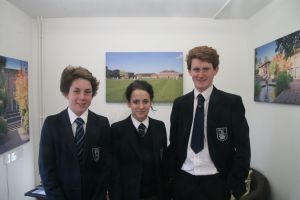 A team of Year 11 Wellington pupils stormed to victory in an inter-school public speaking competition.
A team of Year 11 Wellington pupils stormed to victory in an inter-school public speaking competition.
William Langdon, Phoebe Crossing and Henry Vyse talked their way into the South West final of the ESU’s public speaking competition on Thursday 23rd January. They beat stiff competition from King’s College, Wells Cathedral School, Taunton School, Millfield School and Park School.
“William, as principal speaker, persuaded the gathered crowd at Birchall Hall at Queen’s College, that money had not ruined sport and Henry, who won the prize for the best chairman on the night, was the perfect host” commented Rupert Marsh, Wellington School team’s coach. “Phoebe Crossing asked the questions, with a smile and with a dagger in her cloak!”
The team now go through to the final round at Blundell’s School and if they win, they will compete in the National Finals in London.
The Public Speaking Competition for Schools was started in 1960 by the Brighton and Hove branch of the English Speaking Union. It has evolved to become a highly respected national competition, which provides an opportunity for young people to develop the skills of effective spoken English.
The competition is open to teams of three students in key stage 4 (years 10 and 11) and each team member takes one of three roles – chairperson, speaker or questioner. Students who participate in the competition develop their knowledge of topical issues, while enhancing their speech writing skills, their speaking and presentation skills and their ability to think analytically on their feet. The competition also helps to develop confidence in its participants.
Unlike the ESU Schools Mace, this is not a debating competition, as the format is non-confrontational in nature. The role of the Chairperson is to introduce the Speaker and his or her topic, call on the Questioner and the audience members to put questions to the Speaker and summarise the overall presentation as part of his or her conclusion. The role of the Questioner is to ask probing questions with a view eliciting more information from the speaker and expanding the discussion as a whole.
“We are delighted with the spirit and talent of this team and hope they will triumph in the final stage,” concluded Rupert Marsh.